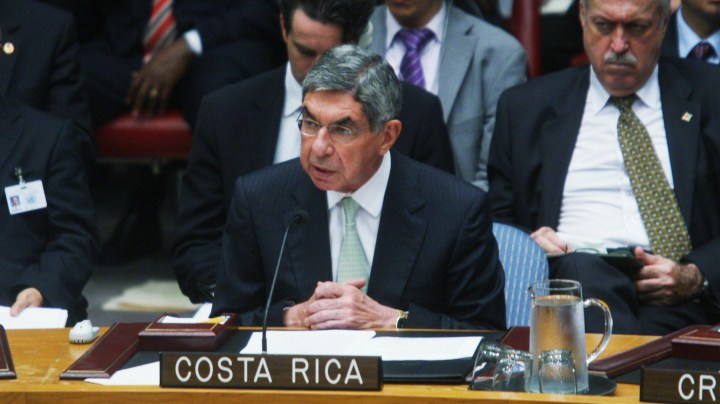4 Women Accuse Former Costa Rican President Óscar Arias of Sexual Assault

Costa Rican President Oscar Arias Sanchez speaks during UN Security Council meeting at the United Nations headquarters September 24, 2009 in New York City. Photo by Hiroko Masuike/Getty Images
Days after a woman accused Óscar Arias, the former Costa Rican president, of sexual assault, three more have spoken out against him.
The first accusation came from Alexandra Arce von Herold, a 34-year-old psychiatrist and nuclear disarmament activist. On Monday, she filed a criminal complaint, which stated that four years ago, he kissed her, touched her breasts, and penetrated her with his fingers. She then told several people about the incident, including her brother, who said that for weeks, “it was like she had PTSD. She didn’t feel safe.”
Following her accusations – which Arias has denied – Costa Rican journalist Eleonora Antillón, book editor Marta Araya Marroni, and Emma Daly, communications director for Human Rights Watch, have shared their stories.
Antillón said Arias assaulted her in 1986, as he ramped up his presidential campaign. When she came across an article on Tuesday that said a woman accused him of sexual assault, she took to social media to write, “From personal experience with him, I BELIEVE her!!”
Antillón said that in the 1980s, Arias wanted her to work for his presidential campaign. Antillón, who said she had no interest in politics, asked for a high salary in hopes of getting him to drop the offer. But it didn’t seem to bother him. He later asked her to meet at a restaurant, where they were seated in a private room. He touched her thigh and tried to kiss her soon after. She pushed him away and questioned him. “‘It’s just to gain trust,’ he told me, laughing,” she recalled. She left the restaurant.
Four days later, she had another meeting with him and an adviser. He had the adviser step away. “He stood up, he was at his desk, he came over staring hard at me, and he grabbed my hand and put it on his penis, over his pants,” Antillón told the Associated Press. “I said to him, ‘What are you doing?’ and he said, ‘What do you think we’re doing? Look how hard I am.”
After that, she made sure she was never alone with him. The incidents have affected her in the last three decades. When he won the Nobel Peace Prize in 1987, she felt physically sick. It also made her change the way she dressed; she felt she had to cover up.
Araya Marroni worked with Arias when she edited Con velas, timón y brújula, his collection of essays and speeches. One day, he put his hand on her leg, which she told him she found inappropriate. He later called her two times and asked her to come over for a massage.
“I never kept it a secret,” Araya said, according to The New York Times. “I told everyone. The only reason I would have to publish this is so that the people believe the women who file complaints. It disgusts me a lot that people always think these are lies.”
Daly – who was then a journalist based in Costa Rica – said Arias groped her in 1990 at a hotel lobby in Nicaragua. Daly, who had interacted with Arias before as a journalist, saw him enter the lobby of the Intercontinental Hotel and asked him a question. “And instead of answering my question, he stopped and looked at me and leaned forward, and he put his hands on my chest and sort of pulled it down between my breasts and then said, ‘You’re not wearing a bra’ – or words to that effect,” she said. “I was so shocked, all I could think of to say was, ‘Yes I am wearing a bra,’ which is a ridiculous reaction but that’s what I did in the moment, and he walked on. A woman next to me, another reporter, said to me: ‘I saw what happened. I’ll support you if you want to do something.’ And I said, ‘No, that’s fine, forget about it.'”
In late 2017, when people started using “Me too” – a term activist Tarana Burke began using at least a decade earlier – to share their own experiences of sexual assault and sexual harassment, she thought about speaking out. But she didn’t, though she did make a vague comment on a friend’s post that read, “even a president and Nobel laureate.”
This week, she said she felt it was her responsibility to speak out, and she hopes that it leads to change across Latin America. “It would be really wonderful if this spurred and some kind of a reckoning in Latin America with men who harass women, particularly at work … some kind of moment where they understood that there’s a need for systemic change and it’s really not OK to just touch women because you feel like it.”